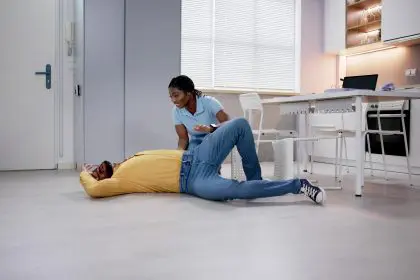Feeling dizzy or experiencing blurry vision when you stand up can be alarming. Whether it hits you at home, at work or during a workout, that moment of instability may feel like your body is betraying you. But this sensation is more common than you might think — and it’s your body’s way of signaling something needs attention.
Understanding what causes these sudden shifts can empower you to respond with care, rather than fear. In some cases, the issue is minor and easily fixable. In others, it could be a warning sign of something more serious that deserves medical attention.
What happens when you stand up
When you rise from a seated or lying position, your body quickly adjusts to pump blood upward against gravity. Your heart, blood vessels and nervous system coordinate to ensure blood flows to your brain efficiently. If this system doesn’t react quickly enough, the result can be a drop in blood pressure — causing dizziness or blurred vision.
This condition is known medically as orthostatic hypotension. It can feel like the room spins, your eyesight fades or your knees go weak. It’s not always a sign of illness, but when it happens often, it’s worth exploring what’s going on.
Common causes to consider
Dehydration disrupts circulation If you’re not drinking enough fluids, your blood volume decreases. That means there’s less fluid circulating through your body, making it harder to maintain stable pressure when you change positions. Even mild dehydration from a hot day or a busy schedule can trigger these symptoms.
Warning signs of dehydration include dry mouth, fatigue, dark urine and reduced urination.
Medications may be to blame Several prescriptions can lower your blood pressure or affect your nervous system. Diuretics, beta-blockers, antidepressants and some medications for Parkinson’s disease are known culprits. If you’ve recently started a new medication and notice lightheadedness when standing, talk to your doctor about adjusting your dosage or switching treatments.
Low blood sugar makes you feel faint Skipping meals or having long gaps between eating can cause your blood sugar to drop. This lack of fuel can impair your brain’s function temporarily, leading to dizziness, blurred vision and even shakiness. People with diabetes are especially at risk for these sudden drops.
Warning signs that need attention
Cardiovascular issues While momentary dizziness is usually harmless, frequent episodes may indicate a heart condition. An irregular heartbeat, valve disorder or reduced cardiac output can prevent the brain from receiving enough oxygen-rich blood. That moment of imbalance could be a small clue to a bigger issue.
Neurological problems Your balance and vision are controlled by complex neural pathways. If there’s a disruption — due to a condition like multiple sclerosis, neuropathy or even a prior concussion — you might experience these symptoms more regularly. In these cases, the episodes are usually accompanied by other signs like numbness, tingling or coordination trouble.
Lifestyle factors that contribute
Standing too quickly Sometimes the problem is simply moving too fast. Jumping up suddenly after sitting or lying down can surprise your body. This is especially common in the morning, when your blood pressure tends to be lower.
To reduce your risk, pause before standing. Flex your ankles and wiggle your toes to get circulation going, then stand slowly.
Alcohol or caffeine Both substances can interfere with your body’s natural balance. Alcohol dilates blood vessels and can dehydrate you, while too much caffeine may cause jitters and a quick rise and fall in blood pressure. When combined with other factors, they make you more prone to that faint feeling.
When to seek medical help
Although occasional dizziness is usually benign, recurring or severe episodes should not be ignored. Seek professional advice if you notice:
- Fainting or falling
- Chest pain or heart palpitations
- Difficulty speaking or moving
- Severe headaches
- Vision that stays blurred longer than a few seconds
These may be signs of a deeper problem requiring timely intervention.
Prevention strategies
You can take proactive steps to reduce your risk of dizziness and vision changes after standing:
Stay hydrated: Aim for at least 8 glasses of water daily, especially in hot weather or after physical activity.
Eat regularly: Balanced meals help maintain stable blood sugar.
Take your time: Move slowly from sitting or lying to standing.
Wear compression socks: These can help promote circulation, especially if you’re standing for long periods.
Talk to your doctor: If medication side effects are suspected, discuss possible alternatives.
Special considerations by age group
Teenagers
Rapid growth during adolescence can sometimes cause momentary dips in blood pressure when standing. This is usually temporary and resolves with better hydration and diet.
Older adults
Seniors are more prone to chronic low blood pressure, especially if they’re managing multiple conditions or medications. Fall prevention becomes critical here, and home safety checks are a smart step.
Athletes
People who train hard may not realize they’re dehydrated or have electrolyte imbalances. Overtraining without rest can also trigger systemic fatigue, making postural dizziness more likely.
Managing the emotional impact
For many people, the emotional impact of these episodes is just as troubling as the symptoms. The fear of passing out in public, of falling at home or of losing control can lead to anxiety, avoidance behaviors and a reduced quality of life. That anxiety can then worsen the dizziness — a vicious cycle that needs to be addressed both physically and emotionally.
Support groups, mental healthcare and reassurance from health professionals can all play a role in helping you feel safe in your body again.
Finding your balance
You don’t have to accept dizziness or blurred vision as just a quirk of your body. Your health, your safety and your peace of mind matter. While many causes of this condition are simple and solvable, they should never be brushed off.
Whether it’s staying hydrated, moving mindfully or seeking medical care, every step you take puts you closer to balance. Your body speaks in signals. This one just might be asking you to slow down, listen and respond with care.













